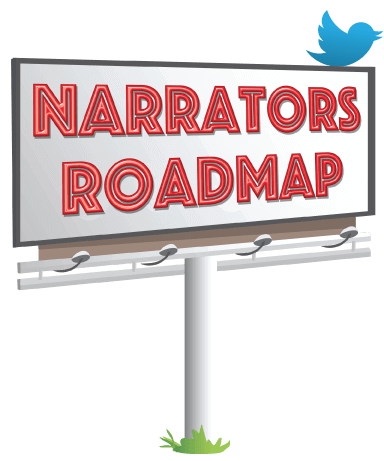I invite audiobook narrators who have vocations beyond narration to be interviewed on Pit Stop. Before the episode ends, I ask most guests a variation of this question:
What advice could you share with others
who want to expand their horizon beyond narration?
This article contains comments from the narrators who spoke during Season 1. For more inspiration, be sure to check out the shows!
My advice is work from the inside out, not the outside in. You’re making the choices for what you want deep down, not what you think you have to do to be a successful person in the industry. The outside world wants you to do more of something or do things their way or change this. I rejected it and ignored the outside world and including social media. I just ignored and I kept doing what I wanted to do with it. We have the power to just let the noise stay outside of us. You’re still doing it for the love of it and just being smart about business. You can marry the two, but I think that the love comes first.
I think there are two things that you can think about. The first is what is the purpose behind what you’re doing? I find that my why really helps drive me into figuring out what is right for me. When you see opportunities come to you, how do you know whether that’s the right opportunity for you or whether it’s something that’s going to take you off course? Running a small business is really hard work. If you don’t have your reason for doing that, like really settled in your soul, it’s going to be very difficult to keep doing it when the going gets tough, when you hit a problem or a roadblock. Then, make sure you’ve got a support network that’s going to help you as you’re pursuing that other thing.
[I didn’t ask Andi the question at the top of this page. However, she shared a golden tip that narrators can implement immediately.]
I use an app called Calendly, and it’s great because it looks for the next available spot. It books you in that spot. It asks you a couple of questions about what are the things that you want to talk about, either performance things or business things, and it collects payment right there. It puts [the appointment] automatically on my calendar, so it eliminates the back and forth.
One way that narrators can put that to really good use is to set up 15-minute free consultations. If an author asks to meet with you about a potential project and they want to know how to do that, you can send them your calendar link. That way, you can make sure that people only ask for your time when it’s available. You can protect your recording time by not making it show up on the calendar.
I’m like a serial hobbyist. I love trying things out and getting expertise and learning about things. So just doing that in general and cultivating that it as a habit is, I think, great if you’ve got something you enjoy doing and. Then then just do it. And any information you can treat it as a as a learned skill where you’re constantly learning more about how to do it and how to do it well. And the industry that it’s in, if there is one. And then maybe at some point it develops into a thing that you want to pursue. It’s like watching a fruit grow, you know, like tend it. And if it gets big enough, like, oh, maybe I want to pick this…or not.
I would say learning to trust your gut. I’m working at it every day. I find that it’s times that I’ve had an instinct and trusted it that have led me to a good a good opportunity rather than just thinking of something from the top down and working it out logically. There’s a place for all this to go. I just wish everyone a smooth journey as possible. It’s never smooth, and it’s never easy. But it’s worthwhile.
Whatever you choose to do, remember, we have to have a skill set behind it. Once you build the skill set, you’ve got to have a presentation that allows you to tell other people that, okay, I am doing this thing now. Knowing that for every new thing that we’re doing, there’s there’s no impossibilities. Everything is possible. It is remembering that each individual category that we are trying to become, to add to our repertoire, has a skill set that you need to educate yourself on. You can’t wing it and expect to have great results. You’ve got to educate yourself the right way.
I think one of the things that I realized pretty early on as a freelancer is that I didn’t need to ask permission. So if there are things that you want to do or try, you don’t have to ask anybody. You can just do it and try it. Sometimes things work out, and sometimes they don’t. There’s nothing to be ashamed of. You’re learning. You’re stretching yourself. It’s awesome!
Find something that’s missing in the genre that you are passionate about or in the industry that you are passionate about and attack it like that portion will go away tomorrow if you don’t act. Not only do you get the sense that you’re doing something good for the industry, you will not be putting all your eggs in one basket.
[I didn’t ask Alison the question on this page. At the end of our conversation, she shared the following advice which can help you in all circumstances.]
I said to [a friend who was dying], if you could give three pieces of advice to the people who are left behind, what would they be?
Love is the only thing that matters.
Remember that most people are doing the best they can with who they are, and connect because it is only in connection that love can find expression.
Finally, Desmond Tutu’s quote, which has helped me tremendously and always will, I think, is remember, you can’t control what happens to you, but you can control how you respond to it.
What in narration did you enjoy the most? And can that be turned into something? So just as an example, if in narrating audiobooks you found that you really like to play very mysterious characters and create a sense of mystery, then what could you also do with that? Does that lead you to wanting to write something around a character that you’d like to film or play on stage, or does that take you to actually taking a course to become an actual detective? That’s the thing — there’s no limits with it. We can talk about just in the parameters of entertainment, but also sometimes doing these things well outside of it.
We forget about these things. I feel like I picked up these habits from other actors along the way of like “If you’re not like eating, breathing, sleeping, getting your next gig, somebody else is going to get the gig.” That’s worthless information. It’s a worthless attitude because it only lasts for so long. It just becomes not worth it, especially if the gig isn’t fulfilling.
Reverse engineering what we want and already finding those things in life. They’re already within us and some of us either know them and can rattle them off, or we have yet to explore and find those things. That finding is so much fun! It’s such an adventure, and the “Artist’s Date” can be the entryway into it.
And for anybody who hasn’t read Julia Cameron’s The Artist’s Way, she talks about going taking yourself on an Artist Date. You can check out her book to to see how she explains it exactly. It’s so great because your artist date could be depending on your interests. It could be going to the junkyard and picking out something for a weird art sculpture. Or it could be going to a museum. Start exploring [by] going on an artist date and [doing] something that supports that thing that you’re interested in exploring outside of narration.
First, just do some personal brainstorming if you’re really not sure what you want to do. So if you don’t know that you want to do a podcast, but you want to do something else, just brainstorm and be crazy. Come up with crazy ideas [like] I want to talk to somebody about audiobooks but don’t like the podcast format. Come up with everything you can think of. Give a talk at a local library; give a talk on a street corner, Go into a bar once a week and just pick somebody at random and see if they’ll listen to you. Allow yourself the ability to just think of anything, then narrow it down.
Once you have a couple of good ideas, I’m a big fan of doing a substantial amount of research before you actually start something. Finding out who else is doing this kind of thing. How are they doing it? If I was going to start doing that thing, whatever it is, how would I do the first steps?
You don’t have to turn everything into a career that could be a hobby. Not everything has to be monetized. Just because you enjoy something doesn’t mean you should turn it into a business.
These are the things I have to constantly remind myself. The things that are truly meant for you, you will want you have a deep desire to continue doing it until you don’t. There’s just so much beauty in the world. Why would you keep yourself from doing those things?
Now you also have to keep your family and your loved ones in mind. You can do whatever you want, but I personally want to give my time and attention to them first and foremost. So I think anything that satisfies me creatively while also maintaining balance in my home, is what I really value in life. It’s knowing where to pull back and when to pull back. That’s the challenge.
Do it! One of the biggest things for me when it comes to business is to diversify and find multiple streams of income. Because especially in narration, it’s hard. I mean, this is a hard business to make a career out of. So just do it. If you find a skill that you are really good at something, you know a lot about, something you can educate people on and just go for it, give it a shot, see how it goes, learn as you go. Don’t wait.
Do it, especially if it scares you. Do it. I would also say research it thoroughly before you look for customers. You know, it’s not fair to experiment with a business relationship. If you’re thinking about narration, it’s not fair to your author to experiment and learn on their baby. So whatever you’re planning on doing, whether it’s extracurricular or focused on your profession, make sure you research it before you do it. You only have one chance to make a first impression. It’s not a good look to make a bumbling first impression with things that you could have easily discovered on your own before you made contact.
Jennifer Jill Araya made a point of saying that most full time narrators have something else that they do. I feel like at one point in my career, I was just a full time narrator, and it took a little bit of the joy away. So I encourage everybody to find the other things that bring you the joy.
[Khristine Hvam’s and PJ Ochlan’s “Play” workshop taught] how important it is that we see narration as our time to play. It lit this little spark. Yes, it’s a freelance job, and it’s flexible, and I can make it work around my schedule so that I can do the other things that spark joy and make me. So if there’s anything you like, I say, go for it.
The whole reason that I made this transition is because there were things that were missing or broken in the industry, and I saw this possibility. It came out of my passions and enthusiasm and the particular perspective that I brought to this world. So I’d say to people: really dig in and explore yourself and follow the tickle, the little glimmer of something that’s calling out to you. Think about the things that are dissatisfying to you. Do you have the ability to fix them? How could you fix them? How could you contribute?
You can give back. You can solve problems You can close gaps that you’re worried about, and those things could turn into a vocation or an avocation or just simply be something that you do to add value.
What are you curious about, and what interests you? It doesn’t matter if it needs to be something that’s going to make you money necessarily, unless you really need something that you know can help you make ends meet. But if you’re lucky enough to have the ability to pursue something regardless of whether it pays you or not, what would that be? I think just taking a walk and getting lost in your own thoughts is helpful. I’m actually advocating don’t listen to an audiobook. Just come with your thoughts.
If you’re augmenting, I think it’s totally a common thing. It becomes magical when it aligns with your particular skills and abilities. If you have another set of skills that runs in parallel or augments the narration in particular and can work in harmony, definitely don’t hesitate. You’ve got something special to offer. You do have to take a little bit of a leap, because whatever you’re going to set up, it’s another investment of your time. But if you have some particular little special thing that’s a little different than everybody else, go for it.
Other resources on this topic:
- These articles may help you reflect on your interests and passions and explore new possibilities for avocations:








